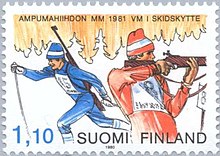 Biathlon World Championships 1981 stamp | |
| Host city | Lahti |
|---|---|
| Country | Finland |
| Events | 3 |
| Opening | 12 March 1981 |
| Closing | 15 March 1981 |
The 18th Biathlon World Championships were held in 1981 in Lahti, Finland. [1]
 Biathlon World Championships 1981 stamp | |
| Host city | Lahti |
|---|---|
| Country | Finland |
| Events | 3 |
| Opening | 12 March 1981 |
| Closing | 15 March 1981 |
The 18th Biathlon World Championships were held in 1981 in Lahti, Finland. [1]
| Medal | Name | Nation | Penalties | Result |
|---|---|---|---|---|
| Heikki Ikola | 0 | 1:13:07.2 | ||
| Frank Ullrich | 2 | 1:14:09.6 | ||
| Erkki Antila | 3 | 1:14:51.1 |
| Medal | Name | Nation | Penalties | Result |
|---|---|---|---|---|
| Frank Ullrich | 1 | 33:08.5 | ||
| Erkki Antila | 0 | 33:10.1 | ||
| Yvon Mougel | 0 | 33:13.5 |
| Medal | Name | Nation | Penalties | Result |
|---|---|---|---|---|
| East Germany | ||||
| West Germany Peter Angerer | ||||
| Soviet Union Vladimir Alikin |
| Place | Nation | Total | |||
|---|---|---|---|---|---|
| 1 | 2 | 1 | 0 | 3 | |
| 2 | 1 | 1 | 1 | 3 | |
| 3 | 0 | 1 | 0 | 1 | |
| 4 | 0 | 0 | 1 | 1 | |
| 4 | 0 | 0 | 1 | 1 |

The biathlon is a winter sport that combines cross-country skiing and rifle shooting. It is treated as a race, with contestants skiing through a cross-country trail whose distance is divided into shooting rounds. The shooting rounds are not timed per se, but depending on the competition, missed shots result in extra distance or time being added to the contestant's total.
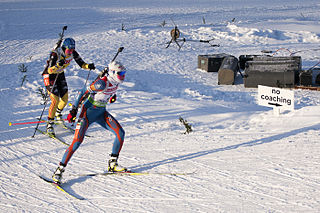
The first Biathlon World Championships (BWCH) was held in 1958, with individual and team contests for men. The original team event, Team (time), was held for the last time in 1965, to be replaced in 1966 by the team event, Relay, which we know today. The number of events has grown significantly over the years. Beginning in 1984, women biathletes had their own World Championships, and finally, from 1989, both genders have been participating in joint Biathlon World Championships. In 1978 the development was enhanced by the change from the large army rifle calibre to a small bore rifle, while the range to the target was reduced from 150 to 50 meters.

Ole Einar Bjørndalen is a retired Norwegian professional biathlete and coach, often referred to by the nickname, the "King of Biathlon". With 13 Winter Olympic Games medals, he is second on the list of multiple medalists behind Marit Bjørgen who has won 15 medals. He is also the most successful biathlete of all time at the Biathlon World Championships, having won 45 medals. With 95 World Cup wins, Bjørndalen is ranked first all-time for career victories on the Biathlon World Cup tour. He has won the Overall World Cup title six times, in 1997–98, in 2002–03, in 2004–05, in 2005–06, in 2007–08 and in 2008–09.
The Biathlon World Cup is a top-level biathlon season-long competition series. It has been held since the winter seasons of 1977–78 for men and 1982–83 for women. The women's seasons until 1986–87 season were called the European Cup, although participation was not restricted to Europeans.
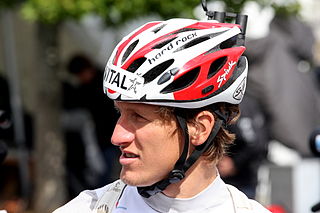
Lars Berger is a former Norwegian biathlete and cross-country skier.

Frank Ullrich is a German politician of the SPD and former biathlete and trainer of the German national team. Since 2021, he has been a member of the Bundestag.

Michael Greis is a former German biathlete.

Sergei Vladimirovich Tchepikov is a Russian politician and a former Soviet-Russian biathlete and cross-country skier who competed at six Winter Olympics, five in biathlon and one in cross-country skiing (1998). His last Olympic performance was a silver medal in the 4 × 7.5 km relay at the 2006 Winter Olympics in Turin.

Biathlon debuted at the 1960 Winter Olympics in Squaw Valley, California with the men's 20 km individual event. At the 1968 Winter Olympics in Grenoble, the men's 4 × 7.5 km relay debuted, followed by the 10 km sprint event at the 1980 Winter Olympics in Lake Placid, New York. Beginning at the 1992 Winter Olympics in Albertville, women's biathlon debuted with the 15 km individual, 3 × 7.5 km relay, and 7.5 km sprint. A pursuit race was included at the 2002 Winter Olympics in Salt Lake City. The top 60 finishers of the sprint race would qualify for the pursuit event. The sprint winner starts the race, followed by each successive biathlete at the same time interval they trailed the sprint winner in that event. At the 2006 Winter Olympics in Turin, a mass start was introduced where the top 30 biathletes from the previous four events were allowed to start together for the competition.

The International Biathlon Union is the international governing body of biathlon. Its headquarters were in Salzburg, Austria, until May 2020, when the Federation moved to Anif, on the outskirts of the city. It was rocked by a corruption scandal that broke in 2018, concerning the Russians bribing its top two officials. In 2022, due to the Russian invasion of Ukraine, Russia and Belarus, as invading nations, were suspended from all international biathlon competitions until further notice.

Andrea Burke, née Henkel is a retired German professional biathlete and the younger sister of Manuela Henkel, a successful cross-country skier. She trained at SV Großbreitenbach. Andrea Henkel started out as a cross-country skier but later specialised in biathlon when women's biathlon became an Olympic sport.

Magdalena "Lena" Holzer is a retired German professional biathlete. She is the most successful woman of all time at Biathlon World Championships and a two-time Olympic gold medalist. At the age of 21, she became the youngest Overall World Cup winner in the history of the International Biathlon Union (IBU). With 34 World Cup wins, Holzer is ranked second all-time for career victories on the Biathlon World Cup tour. She has won the Overall World Cup title three times, in 2007–08, in 2009–10 and her final season in 2011–12. At only 25 years old, Holzer retired from the sport in March 2012, citing a lack of motivation and her desire for a normal life.
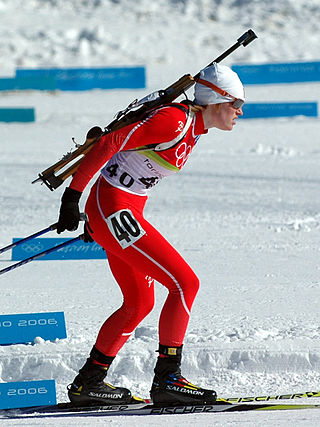
Tora Berger is a retired Norwegian biathlete and Olympic champion.
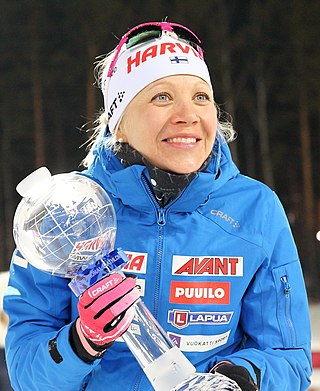
Kaisa Leena Mäkäräinen is a Finnish former world-champion and 3-time world-cup-winning biathlete, who currently competes for Kontiolahden Urheilijat. Outside sports, Mäkäräinen is currently studying to be a Physics teacher at the University of Eastern Finland in Joensuu. Her team coach is Jonne Kähkönen, while Jarmo Punkkinen is her ski coach.
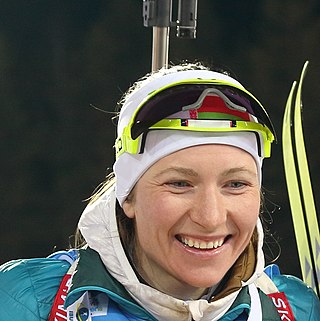
Darya Uladzimirauna Domracheva is a retired Belarusian biathlete and coach who competed in the Biathlon World Cup from 2006 to 2018. She won a gold medal in the 4×6 km relay and a silver medal in the mass start competition at the 2018 Winter Olympics, three gold medals in the pursuit, individual, and mass start competitions at the 2014 Winter Olympics, and a bronze medal in the individual competition at the 2010 Winter Olympics. She was a Biathlon World Cup overall winner for the 2014–15 season.

Tarjei Bø is a Norwegian professional biathlete. Awarded Olympic gold medals, World Championship gold medals and World Cup victories from 2010 to 2022. Bø debuted in the Biathlon World Cup on 26 March 2009 in Khanty-Mansiysk, Russia. In the 2010 Winter Olympics, he earned his first gold medal in the 4 × 7.5 km biathlon relay. On 10 December 2010 he won the World Cup sprint race in Hochfilzen, his first world cup victory. He also won the following pursuit race and anchored the winning relay team. Bø is the older brother of biathlete Johannes Thingnes Bø.
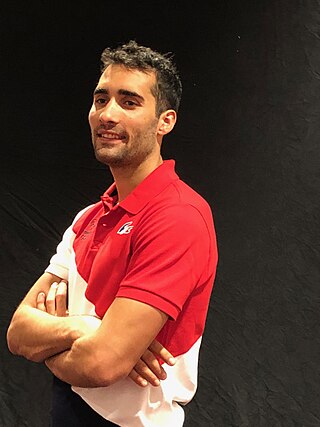
Martin Fourcade is a retired French biathlete. He is a five-time Olympic champion, a thirteen-time World Champion and a seven-time winner of the Overall World Cup. As of February 2018, he is the most successful French Olympian of all time. Fourcade is the all-time biathlon record holder of overall World Cup titles with seven big crystal globes and he's also the all-time record holder of the most consecutive Major Championships titles with at least one non-team gold medal in every major championship from 2011 to 2018.

Anton Vladimirovich Shipulin is a retired Russian biathlete and politician serving as the member of the State Duma since 2019.

Tiril Kampenhaug Eckhoff is a Norwegian former biathlete.

Vetle Sjåstad Christiansen is a Norwegian biathlete.